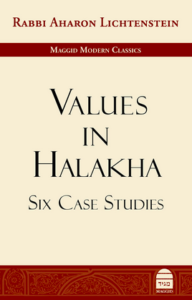By Rabbi Dr. Israel Drazin

BOCA RATON, Florida — I understand that Jewish laws are valuable because they help us learn how to behave and improve ourselves and society.
“Values in Halakha” is by Rabbi Dr. Aharon Lichtenstein (1933-2015). He was an eminent rabbinic scholar and teacher who served as one of the heads of the prestigious Yeshivat Har Etzion in Israel for over 40 years. He received his Ph.D. from Harvard University. He taught literature and Talmud at Yeshiva University in New York and started YU’s “Kollel,” where ordained rabbis continued their studies and was its head for a decade. He moved to Israel in 1971 and became the joint leader of Yeshivat Har Etzion for decades until his death. He published studies on Talmud and Jewish Law and Thought and was awarded the Israel Prize for Torah Literature in 1974. He continues to be considered by many rabbis and scholars as an intellectual and spiritual beacon light.
One of Aharon Lichtenstein’s goals in “Values in Halakha,” Halakha meaning Jewish law, is to show the values embedded within and emerging from Jewish teachings, values that improve individuals and society. He discusses six cases that rabbis needed to decide.
 He tells readers about the contributions to Jewish teachings by the famed Rabbi Moshe Isserles (1525-1572). Isserles was frequently confronted with the apparent conflict of Halakha and the personal needs and desires of the person involved. The cases are fascinating, and how he resolved these matters and what it tells us about Halakha is enlightening. Among much else, Isserles decided that when Halakha gives the opinion of many rabbis, the decider in a case can choose against the majority opinion, which became the Halakha, and rule according to the view of the sole dissenter. In this chapter, he also discusses Humanism. What is it? He offers a definition. “Humanism is a worldview which values man highly.” Should Humanism impact Halakha?
He tells readers about the contributions to Jewish teachings by the famed Rabbi Moshe Isserles (1525-1572). Isserles was frequently confronted with the apparent conflict of Halakha and the personal needs and desires of the person involved. The cases are fascinating, and how he resolved these matters and what it tells us about Halakha is enlightening. Among much else, Isserles decided that when Halakha gives the opinion of many rabbis, the decider in a case can choose against the majority opinion, which became the Halakha, and rule according to the view of the sole dissenter. In this chapter, he also discusses Humanism. What is it? He offers a definition. “Humanism is a worldview which values man highly.” Should Humanism impact Halakha?
Lichtenstein tells readers about Rabbi Ya’ir Hayim Bacharach (1638-1702), who, in analyzing a case, decided whether two conflicting groups could choose to compromise and not follow the Halakha. The issue is interesting, and his decision that the compromise in the case is improper tells us much about Halakha.
Rabbi Bacharach was also involved in a case of whether an individual needs to consider the public interest. A certain man was bankrupt and wanted to move to an area where he could gain profits. The non-Jewish leaders of the new site restricted the number of Jews. If he arrived, it would put the community in danger of various sanctions. May he immigrate to the new locale?
The fourth case involves the concept of Lifnim Mishurat Hadin, going beyond the line of the law. When, for example, the law allows something, such as keeping a found object in some cases, the finder should go beyond the law and return the thing to the former owner.
The fifth case focuses on when, if ever, Jewish authorities can force a reluctant Jew to do what is proper.
The sixth case analyses the responsibilities of recipients of charity. This subject is in the news today in America. Can the government insist that welfare recipients seek work and take it?